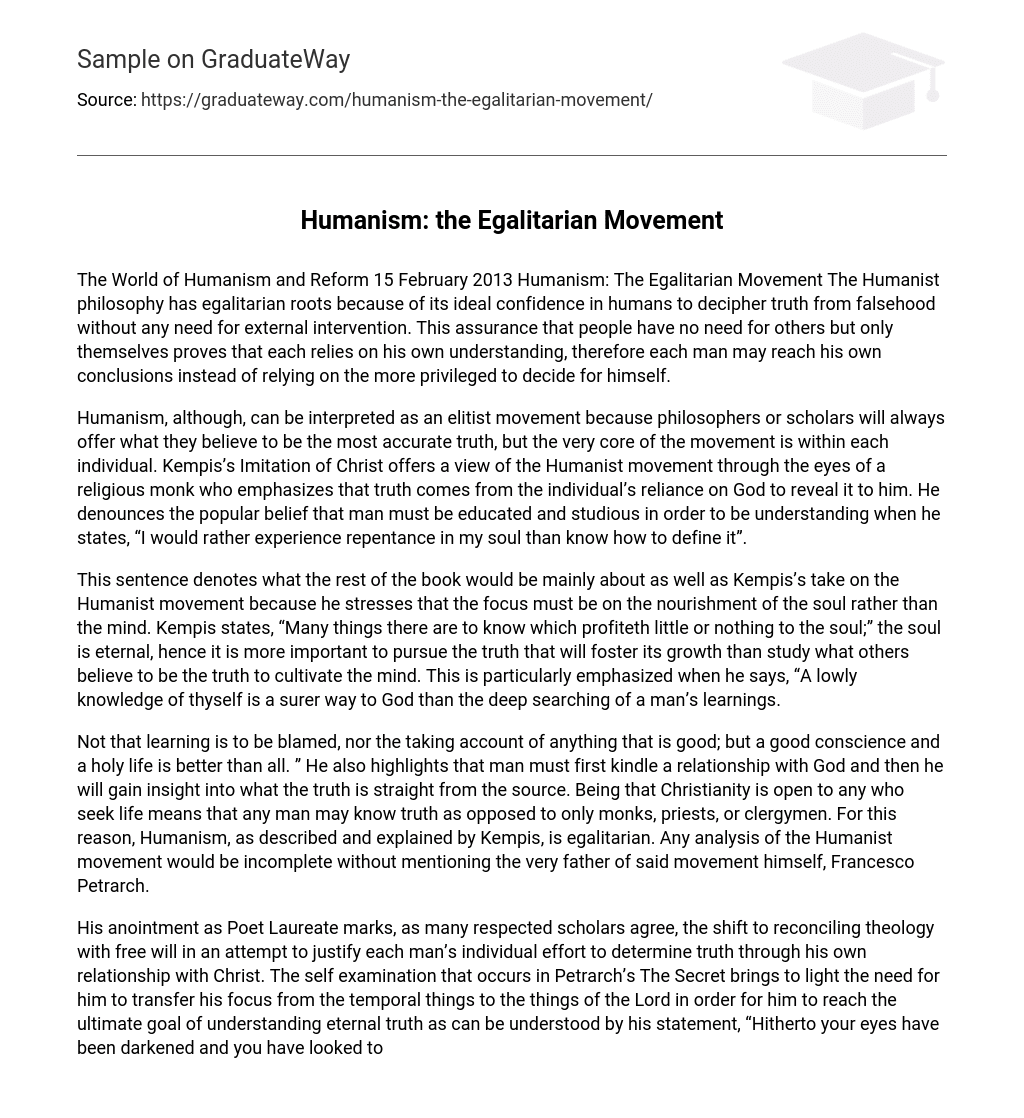The World of Humanism and Reform 15 February 2013 Humanism: The Egalitarian Movement The Humanist philosophy has egalitarian roots because of its ideal confidence in humans to decipher truth from falsehood without any need for external intervention. This assurance that people have no need for others but only themselves proves that each relies on his own understanding, therefore each man may reach his own conclusions instead of relying on the more privileged to decide for himself.
Humanism, although, can be interpreted as an elitist movement because philosophers or scholars will always offer what they believe to be the most accurate truth, but the very core of the movement is within each individual. Kempis’s Imitation of Christ offers a view of the Humanist movement through the eyes of a religious monk who emphasizes that truth comes from the individual’s reliance on God to reveal it to him. He denounces the popular belief that man must be educated and studious in order to be understanding when he states, “I would rather experience repentance in my soul than know how to define it”.
This sentence denotes what the rest of the book would be mainly about as well as Kempis’s take on the Humanist movement because he stresses that the focus must be on the nourishment of the soul rather than the mind. Kempis states, “Many things there are to know which profiteth little or nothing to the soul;” the soul is eternal, hence it is more important to pursue the truth that will foster its growth than study what others believe to be the truth to cultivate the mind. This is particularly emphasized when he says, “A lowly knowledge of thyself is a surer way to God than the deep searching of a man’s learnings.
Not that learning is to be blamed, nor the taking account of anything that is good; but a good conscience and a holy life is better than all. ” He also highlights that man must first kindle a relationship with God and then he will gain insight into what the truth is straight from the source. Being that Christianity is open to any who seek life means that any man may know truth as opposed to only monks, priests, or clergymen. For this reason, Humanism, as described and explained by Kempis, is egalitarian. Any analysis of the Humanist movement would be incomplete without mentioning the very father of said movement himself, Francesco Petrarch.
His anointment as Poet Laureate marks, as many respected scholars agree, the shift to reconciling theology with free will in an attempt to justify each man’s individual effort to determine truth through his own relationship with Christ. The self examination that occurs in Petrarch’s The Secret brings to light the need for him to transfer his focus from the temporal things to the things of the Lord in order for him to reach the ultimate goal of understanding eternal truth as can be understood by his statement, “Hitherto your eyes have been darkened and you have looked too much, yes, far too much, upon the things of earth.
If these so much delight you what shall be your rapture when you lift your gaze to things eternal! ” The work, therefore, expresses that man’s ability to think and decide for himself must be based on his relationship with God more so than his knowledge of scripture or philosophy because the Lord will reveal the truth to him that is a faithful servant. Consequently, each person is his own fountain of truth so long as he has a firm relationship with God which will cultivate his ability to recognize the truth thus the capacity to make out the truth from that which is false.
Another such influential writer of the early Humanist movement was Giovanni Pico della Mirandola. His involvement in Florence’s Platonic Academy exposed him to the reconciliation of Christian religion and philosophical thought that united man’s free will and God’s sovereignty. Pico della Mirandola wrote in his Oration on the Dignity of Man that individuals have the ability to affect their destiny by the decisions they make, stating it best when he says, “To [man] it is granted to have whatever he chooses, to be whatever he wills”.
In this case, each person is capable of their own free will because no man can decide what any one person can or will do in his own intimate decisions even if he is an official or a part of the clergy or government. By this explanation, fate can be affected by the daily choices made by each person; this contradicted what the church was preaching during the late 1400s. Nevertheless, this notion is still widely discussed and accepted by
many scholars and laymen to this day because it is an ever present mystery that challenges the Christian beliefs of whether or not our we have a say in our destinies or if our actions have no purpose because God’s plan will ultimately prevail. Furthermore, Pico della Mirandola states in Oration on the Dignity of Man, “Above all, we should not make that freedom of choice God gave us into something harmful, for it was intended to be to our advantage.
” This quote clearly confirms Pico’s recognition that God made man with the freedom to choose because that ability could take us further into the understanding of truth than His other creations that are void of free will or understanding. In any case, Pico della Mirandola would certainly agree that man has an effect on his own fate especially when he states, “… man’s place in the universe is somewhere between the beasts and the angels, but, because of the divine image planted in him, there are no limits to what man can accomplish…” since every decision made will affect what man undertakes.





